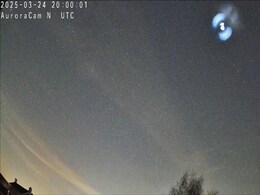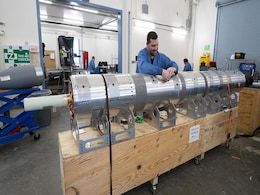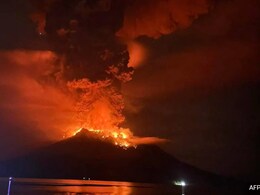Atmospheres
- All
- News
-

"Violation Of Democratic Rights": Pinarayi Vijayan On Row Over New Movie "Empuraan"
- Sunday March 30, 2025
- India News | NDTV News Desk
Kerala Chief Minister Pinarayi Vijayan voiced support for the movie "Empuraan" today, and accused the Sangh Parivar of fostering an "atmosphere of fear" over the film.
-
 www.ndtv.com
www.ndtv.com
-

Two New Exoplanets Found Orbiting a Star in Draco Constellation
- Wednesday April 2, 2025
- Written by Gadgets 360 Staff
Astronomers have identified two exoplanets, TOI-1453 b and TOI-1453 c, orbiting a star 250 light-years away in Draco. The planets, a super-Earth and a sub-Neptune, were detected using NASA’s TESS satellite and the HARPS-N spectrograph. TOI-1453 b is a rocky planet orbiting close to its star, while TOI-1453 c is twice Earth’s size and may have a...
-
 www.gadgets360.com
www.gadgets360.com
-

Mysterious Light Spiral Over Europe Traced to SpaceX Falcon 9 Reentry
- Monday March 31, 2025
- Written by Gadgets 360 Staff
On March 24, a glowing spiral appeared in the night sky across parts of Europe, including the UK, Sweden, Croatia, Poland, and Hungary. The formation lasted for about 12 minutes before fading. Experts confirmed it was caused by a SpaceX Falcon 9 rocket reentering Earth's atmosphere after completing its mission. The phenomenon resulted from frozen f...
-
 www.gadgets360.com
www.gadgets360.com
-

James Webb Telescope Captures Neptune’s Auroras in Stunning Detail
- Monday March 31, 2025
- Written by Gadgets 360 Staff
The James Webb Space Telescope has provided the first-ever direct images of Neptune’s auroras, revealing surprising details about the ice giant’s atmosphere. Unlike auroras on Earth, Jupiter, or Saturn, Neptune’s auroras appear across unexpected locations due to its tilted and offset magnetic field. Scientists also detected the presence of H...
-
 www.gadgets360.com
www.gadgets360.com
-

How A Diffuser Can Enhance Your Home's Atmosphere
- Wednesday March 26, 2025
- Shopping | NDTV Shopping Desk
A home should be more than just a space, it should be a sanctuary, a retreat from the noise and demands of the outside world. From improving air quality to reducing stress, let’s explore how a diffuser can enhance the mood and well-being of a home.
-
 www.ndtv.com
www.ndtv.com
-

NASA to Launch Three Rockets in Alaska to Study Auroral Substorms’ Impact
- Saturday March 29, 2025
- Written by Gadgets 360 Staff
NASA is conducting a rocket experiment from Poker Flat Research Range in Alaska. Three rockets will launch within a three-hour window to study how auroral substorms influence the Earth's upper atmosphere. Scientists will observe whether auroras drive vertical convection or if acoustic-buoyancy waves spread their energy over a wider region. Vapour t...
-
 www.gadgets360.com
www.gadgets360.com
-

Sabdham OTT Release Date: When and Where to Watch Aadhi Pinisetty’s Horror Thriller
- Thursday March 20, 2025
- Written by Gadgets 360 Staff
After a successful theatrical run, Aadhi Pinisetty’s Sabdham is set to stream on Prime Video from March 28, 2025, as per reports. Directed by Arivazhagan Venkatachalam, the film follows a paranormal investigator uncovering eerie deaths in a medical college. Lakshmi Menon plays a sceptical surgeon who clashes with his beliefs. The supernatural thr...
-
 www.gadgets360.com
www.gadgets360.com
-

Atmospheric CO2 Levels Reach 8,00,000 Year-High In 2023: Report
- Wednesday March 19, 2025
- World News | Press Trust of India
The World Meteorological Organization's (WMO) State of the Climate report said the past 10 years (2015-2024) were the warmest on record, with each of the last eight years setting new highs for ocean heat content.
-
 www.ndtv.com
www.ndtv.com
-

NASA’s EZIE Satellites Begin Mission to Study Auroral Electrojets and Space Weather
- Friday March 21, 2025
- Written by Gadgets 360 Staff
NASA’s Electrojet Zeeman Imaging Explorer (EZIE) mission has been launched aboard a SpaceX Falcon 9 from Vandenberg Space Force Base. The trio of small satellites will map auroral electrojets, powerful currents in Earth’s atmosphere linked to solar storms. Their data will enhance space weather prediction models and help understand planetary mag...
-
 www.gadgets360.com
www.gadgets360.com
-

Ancient Volcanoes May Have Helped Create Perfect Balance For Life On Earth
- Wednesday March 12, 2025
- World News | Edited by NDTV News Desk
Latest findings suggest that the Earth's atmosphere went through a sequence of oxygenation episodes fueled by geological and biological interactions rather than a single event.
-
 www.ndtv.com
www.ndtv.com
-

Trump Job Cuts Threaten Climate Research, Public Safety, Warn Scientists
- Monday March 10, 2025
- World News | Agence France-Presse
Climate scientist Tom Di Liberto had dreamed of working at the National Oceanic and Atmospheric Administration (NOAA) since college. After more than a decade as a contractor, he finally secured a full-time position nearly two years ago.
-
 www.ndtv.com
www.ndtv.com
-

Vernal Equinox 2025: Date, Time, and the Science Behind the Event
- Friday March 7, 2025
- Written by Gadgets 360 Staff
The vernal equinox 2025 is set for March 20 at 09:01 UTC, marking the astronomical start of spring in the Northern Hemisphere and autumn in the Southern Hemisphere. This event occurs due to Earth’s axial tilt aligning with its orbit, resulting in nearly equal hours of daylight and night across the globe. While the equinox does not bring perfectly...
-
 www.gadgets360.com
www.gadgets360.com
-

Save Big And Breathe Better: Flipkart Big Bachat Days Offers Air Purifiers At Best Prices
- Wednesday March 5, 2025
- Shopping | NDTV Shopping Desk
The Flipkart Big Bachat Day sale is here, offering incredible discounts on a range of products, but one category that's truly worth your attention is air purifiers. Check out top picks and enjoy the perks of a cleaner atmosphere while saving big.
-
 www.ndtv.com
www.ndtv.com
-

Aditya-L1’s SUIT Telescope Captures First-Ever Solar Flare Kernel, Revealing Unseen Solar Activity
- Friday March 7, 2025
- Written by Gadgets 360 Staff
India’s Aditya-L1 mission has achieved a historic milestone with its Solar Ultra-violet Imaging Telescope (SUIT) capturing the first-ever solar flare kernel in the near-ultraviolet spectrum. This unprecedented observation confirms energy transfer across different layers of the Sun's atmosphere, advancing the understanding of solar flares and spac...
-
 www.gadgets360.com
www.gadgets360.com
-

"Violation Of Democratic Rights": Pinarayi Vijayan On Row Over New Movie "Empuraan"
- Sunday March 30, 2025
- India News | NDTV News Desk
Kerala Chief Minister Pinarayi Vijayan voiced support for the movie "Empuraan" today, and accused the Sangh Parivar of fostering an "atmosphere of fear" over the film.
-
 www.ndtv.com
www.ndtv.com
-

Two New Exoplanets Found Orbiting a Star in Draco Constellation
- Wednesday April 2, 2025
- Written by Gadgets 360 Staff
Astronomers have identified two exoplanets, TOI-1453 b and TOI-1453 c, orbiting a star 250 light-years away in Draco. The planets, a super-Earth and a sub-Neptune, were detected using NASA’s TESS satellite and the HARPS-N spectrograph. TOI-1453 b is a rocky planet orbiting close to its star, while TOI-1453 c is twice Earth’s size and may have a...
-
 www.gadgets360.com
www.gadgets360.com
-

Mysterious Light Spiral Over Europe Traced to SpaceX Falcon 9 Reentry
- Monday March 31, 2025
- Written by Gadgets 360 Staff
On March 24, a glowing spiral appeared in the night sky across parts of Europe, including the UK, Sweden, Croatia, Poland, and Hungary. The formation lasted for about 12 minutes before fading. Experts confirmed it was caused by a SpaceX Falcon 9 rocket reentering Earth's atmosphere after completing its mission. The phenomenon resulted from frozen f...
-
 www.gadgets360.com
www.gadgets360.com
-

James Webb Telescope Captures Neptune’s Auroras in Stunning Detail
- Monday March 31, 2025
- Written by Gadgets 360 Staff
The James Webb Space Telescope has provided the first-ever direct images of Neptune’s auroras, revealing surprising details about the ice giant’s atmosphere. Unlike auroras on Earth, Jupiter, or Saturn, Neptune’s auroras appear across unexpected locations due to its tilted and offset magnetic field. Scientists also detected the presence of H...
-
 www.gadgets360.com
www.gadgets360.com
-

How A Diffuser Can Enhance Your Home's Atmosphere
- Wednesday March 26, 2025
- Shopping | NDTV Shopping Desk
A home should be more than just a space, it should be a sanctuary, a retreat from the noise and demands of the outside world. From improving air quality to reducing stress, let’s explore how a diffuser can enhance the mood and well-being of a home.
-
 www.ndtv.com
www.ndtv.com
-

NASA to Launch Three Rockets in Alaska to Study Auroral Substorms’ Impact
- Saturday March 29, 2025
- Written by Gadgets 360 Staff
NASA is conducting a rocket experiment from Poker Flat Research Range in Alaska. Three rockets will launch within a three-hour window to study how auroral substorms influence the Earth's upper atmosphere. Scientists will observe whether auroras drive vertical convection or if acoustic-buoyancy waves spread their energy over a wider region. Vapour t...
-
 www.gadgets360.com
www.gadgets360.com
-

Sabdham OTT Release Date: When and Where to Watch Aadhi Pinisetty’s Horror Thriller
- Thursday March 20, 2025
- Written by Gadgets 360 Staff
After a successful theatrical run, Aadhi Pinisetty’s Sabdham is set to stream on Prime Video from March 28, 2025, as per reports. Directed by Arivazhagan Venkatachalam, the film follows a paranormal investigator uncovering eerie deaths in a medical college. Lakshmi Menon plays a sceptical surgeon who clashes with his beliefs. The supernatural thr...
-
 www.gadgets360.com
www.gadgets360.com
-

Atmospheric CO2 Levels Reach 8,00,000 Year-High In 2023: Report
- Wednesday March 19, 2025
- World News | Press Trust of India
The World Meteorological Organization's (WMO) State of the Climate report said the past 10 years (2015-2024) were the warmest on record, with each of the last eight years setting new highs for ocean heat content.
-
 www.ndtv.com
www.ndtv.com
-

NASA’s EZIE Satellites Begin Mission to Study Auroral Electrojets and Space Weather
- Friday March 21, 2025
- Written by Gadgets 360 Staff
NASA’s Electrojet Zeeman Imaging Explorer (EZIE) mission has been launched aboard a SpaceX Falcon 9 from Vandenberg Space Force Base. The trio of small satellites will map auroral electrojets, powerful currents in Earth’s atmosphere linked to solar storms. Their data will enhance space weather prediction models and help understand planetary mag...
-
 www.gadgets360.com
www.gadgets360.com
-

Ancient Volcanoes May Have Helped Create Perfect Balance For Life On Earth
- Wednesday March 12, 2025
- World News | Edited by NDTV News Desk
Latest findings suggest that the Earth's atmosphere went through a sequence of oxygenation episodes fueled by geological and biological interactions rather than a single event.
-
 www.ndtv.com
www.ndtv.com
-

Trump Job Cuts Threaten Climate Research, Public Safety, Warn Scientists
- Monday March 10, 2025
- World News | Agence France-Presse
Climate scientist Tom Di Liberto had dreamed of working at the National Oceanic and Atmospheric Administration (NOAA) since college. After more than a decade as a contractor, he finally secured a full-time position nearly two years ago.
-
 www.ndtv.com
www.ndtv.com
-

Vernal Equinox 2025: Date, Time, and the Science Behind the Event
- Friday March 7, 2025
- Written by Gadgets 360 Staff
The vernal equinox 2025 is set for March 20 at 09:01 UTC, marking the astronomical start of spring in the Northern Hemisphere and autumn in the Southern Hemisphere. This event occurs due to Earth’s axial tilt aligning with its orbit, resulting in nearly equal hours of daylight and night across the globe. While the equinox does not bring perfectly...
-
 www.gadgets360.com
www.gadgets360.com
-

Save Big And Breathe Better: Flipkart Big Bachat Days Offers Air Purifiers At Best Prices
- Wednesday March 5, 2025
- Shopping | NDTV Shopping Desk
The Flipkart Big Bachat Day sale is here, offering incredible discounts on a range of products, but one category that's truly worth your attention is air purifiers. Check out top picks and enjoy the perks of a cleaner atmosphere while saving big.
-
 www.ndtv.com
www.ndtv.com
-

Aditya-L1’s SUIT Telescope Captures First-Ever Solar Flare Kernel, Revealing Unseen Solar Activity
- Friday March 7, 2025
- Written by Gadgets 360 Staff
India’s Aditya-L1 mission has achieved a historic milestone with its Solar Ultra-violet Imaging Telescope (SUIT) capturing the first-ever solar flare kernel in the near-ultraviolet spectrum. This unprecedented observation confirms energy transfer across different layers of the Sun's atmosphere, advancing the understanding of solar flares and spac...
-
 www.gadgets360.com
www.gadgets360.com
















